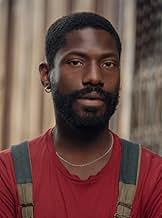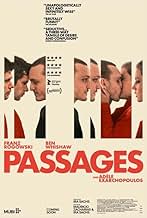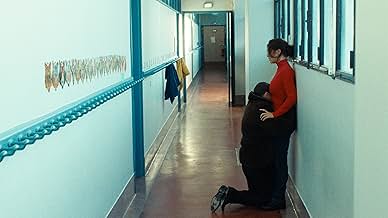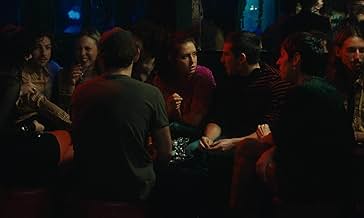CALIFICACIÓN DE IMDb
6.6/10
14 k
TU CALIFICACIÓN
Trata de dos hombres que llevan quince años juntos y de lo que ocurre cuando uno de ellos tiene una aventura con una mujer.Trata de dos hombres que llevan quince años juntos y de lo que ocurre cuando uno de ellos tiene una aventura con una mujer.Trata de dos hombres que llevan quince años juntos y de lo que ocurre cuando uno de ellos tiene una aventura con una mujer.
- Dirección
- Guionistas
- Elenco
- Premios
- 4 premios ganados y 25 nominaciones en total
Thibault Carterot
- Thibault
- (as Thibaut Carterot)
Theo Gabilloux
- Young Actor
- (as Théo Gabilloux)
- Dirección
- Guionistas
- Todo el elenco y el equipo
- Producción, taquilla y más en IMDbPro
Opiniones destacadas
More promise than execution, "Passages" tackles twentysomethings navigating gender fluid sexuality with Paris as the backdrop. Welcome to the Tomas, Martin and Agathe dance. Narcissist and disagreeable German film director, Tomas is the unfortunate rotten core here. His marriage to Martin is disrupted by a purely sexual tryst with fetching schoolteacher Agathe, and Tomas can't wait to gush about his walk on the straight side to his husband. Things don't go well.
An interesting premise for sure, but one that plays out sloppily, without any character development to speak of, unless Tomas' deplorable indifference counts. An ugly persona, with an appearance to match - a patchy beard, gaunt features, a snaky lisp and a horrific wardrobe (which ironically, is getting kudos from GQ) - it's a bit of a puzzle as to his alure. Surprisingly, he's quite dull to boot, which makes for an odd protagonist: a difficult one to hate, or care for.
"Passages" takes stabs at the French New Wave, dishing up randy youth moving aimlessly through Paris to a jazzy backdrop, but with the exception of a lovely, film-closing evening bike ride, doesn't hit the mark. Without style, the absence of substance dominates this lackluster experience.
An interesting premise for sure, but one that plays out sloppily, without any character development to speak of, unless Tomas' deplorable indifference counts. An ugly persona, with an appearance to match - a patchy beard, gaunt features, a snaky lisp and a horrific wardrobe (which ironically, is getting kudos from GQ) - it's a bit of a puzzle as to his alure. Surprisingly, he's quite dull to boot, which makes for an odd protagonist: a difficult one to hate, or care for.
"Passages" takes stabs at the French New Wave, dishing up randy youth moving aimlessly through Paris to a jazzy backdrop, but with the exception of a lovely, film-closing evening bike ride, doesn't hit the mark. Without style, the absence of substance dominates this lackluster experience.
- hipCRANK.
This is a very grounded film that challenges the viewers morality and values. The "Peter Pan" protagonist is a hedonistic director fumbling through love and life and refusing to "grow up". He thinks everyone will accept his choices because he assumes the world is on the same page: reality hits very differently. I like the exploration of queerness in this film and the torments of fluidity.
The performances are quite spectacular, especially by Adèle Exarchopoulous. Time and again she proves to be sexy, vulnerable, exquisite in every frame.
Franz Rogowski has a very Phoenix brothers quality to him and portrays the complex and haunted character very effectively, navigating from sexy, commanding, vulnerable to selfish and self-centered.
A very simple film about very complex humans. I think the cinematography, the casting, the writing, the direction all point to a masterful filmmaking that delves deeply into the contemporary human condition where we all still have a very long way to go before accepting each other for who we are.
The performances are quite spectacular, especially by Adèle Exarchopoulous. Time and again she proves to be sexy, vulnerable, exquisite in every frame.
Franz Rogowski has a very Phoenix brothers quality to him and portrays the complex and haunted character very effectively, navigating from sexy, commanding, vulnerable to selfish and self-centered.
A very simple film about very complex humans. I think the cinematography, the casting, the writing, the direction all point to a masterful filmmaking that delves deeply into the contemporary human condition where we all still have a very long way to go before accepting each other for who we are.
This movie's faint appeal as a post-modern take on a love triangle seems exhausted by the implausible image, featured in many promotional cards, of Franz Rogowski's sneering Tomas jazz-snuggling up to Adèle Exarchopoulos' Agathe on a dance floor. Tantalizing, but no, the film does not explain how this pair makes any chemical, emotional, or even symbolic sense. Franz Rogowski has a convincing restraint and charisma as an outsider in films like "In den Gängen" or "Transit," but here, cast in a sexual melodrama (between characters Tomas, Martin, and Agathe) as a self-obsessed bourgeois, he acts as if he were a guy who manages a cable company by day and was hired for this film because of his eyebrows. That said, Rogowski has little in the script to work with: why any character should care about this selfish oaf is head-ache-making opaque. The script tempts Rogowski into an egotistical flatness, his voice a monotonous whine, whose musical equivalent is a beginner's huffing atonally on a saxophone, alone. The character knows no boundaries. Part demon-child, part mindless fungus, he one minute halts ordinary conversations imperiously and the next shows up uninvited (opening doors himself), babbling needy demands in somebody's dwelling or workplace. Aiming for the top edge of the goal, the filmmakers instead deliver Tomas as a kind of compound of all the silly-shirt, night-scene poseurs in the history of Saturday Night Live, going back to Dan Ackroyd's "wild and crazy guy," Bill Hader's Stefon, and the Roxbury Guys of Ferrell and Kattan. However, Tomas's nylon tank and midriff-baring macrame-top collection beats all of these SNL figures in a race to "ridiculous." We are supposed to believe that a woman, played by Adèle Exarchopoulos, who recalls Monica Vitti and Anna Karina in her voluptuous elegance, toughness, and vulnerability, is obsessed with a sniveling, narcissistic twit, a dying fire-pit of acrid banalities. Unsurprisingly, after about five minutes of film time, Exarchopoulos resonates an odd fatigue incompatible with Agathe's allegedly incandescent fascination with Tomas, and she betrays a glowing concern that the actress, not the character, is in a bad dream: this movie. Ben Whishaw as Martin is such a maestro that he is the only one of the three (in other work excellent) principal actors who can bring himself fully to the script with a believable, developing, pained realization, but the film at large is so full of abrupt, nonsensical leaps of mood and commitment that the whole exercise could be a workshop in which the players were challenged to vitalize premises that make scant sense. Another film that much more convincingly allows the wonderful Adèle Exarchopoulos to play on a plane of "nothing left to lose" is Rien à foutre (2021).
Not all films need to be message driven, but I think any director or writer makes a film because they have something to say. In that sense, I'm not sure what 'Passages' wanted to say.
There was an ample potential to make an interesting social cut in the age of more fluid sexuality. "don't pigeon-hall yourself", "follow your heart"", you could be anything and love anybody"... and so on all sound great, but how it actually works in reality, and how it could clash with the traditional idea of a committed relationship, gender roles, and responsibility of a parenthood. There still are remnants of such questions and reflections in 'Passages'. Problem is Tomas is too big a rotten character and consumes all the drama. He's self absorbed (resulting in being selfish even without a malicious intend), cowardly, dishonest with himself and others, emotionally needy yet wants to dominate the situation, and above all manipulative (oh, and his fashion sense is pretty atrocious, but that's just based on my taste). It makes in contrast his male and female partners innocent victims, leaving very little room for a balanced reflection on sexuality/relationship/gender role issues.
Maybe a social commentary was not the director's intention. Maybe a character study was the goal? But surprisingly we don't really get to see the depth of Tomas and even less of Martin and Agathe. Why is Tomas the way he is? What was Tomas's relationship with Martin like before the storm? What did Tomas really see in Agathe and the future with her?
All the sex scenes were fun to watch, but if a character study was the goal maybe the film could have used those minutes more towards... well, to show the character. 'A rotten character ruins the lives of others' is too obvious a conclusion for a character study or even just any old relationship drama.
Passages is an OK drama. Technically sufficient and actings are decent (though I think it failed to utilize all the potential of such interesting actors as Whishaw and Rogowski). But it left me wondering what it really was all for... or is it just me out of my depth?
There was an ample potential to make an interesting social cut in the age of more fluid sexuality. "don't pigeon-hall yourself", "follow your heart"", you could be anything and love anybody"... and so on all sound great, but how it actually works in reality, and how it could clash with the traditional idea of a committed relationship, gender roles, and responsibility of a parenthood. There still are remnants of such questions and reflections in 'Passages'. Problem is Tomas is too big a rotten character and consumes all the drama. He's self absorbed (resulting in being selfish even without a malicious intend), cowardly, dishonest with himself and others, emotionally needy yet wants to dominate the situation, and above all manipulative (oh, and his fashion sense is pretty atrocious, but that's just based on my taste). It makes in contrast his male and female partners innocent victims, leaving very little room for a balanced reflection on sexuality/relationship/gender role issues.
Maybe a social commentary was not the director's intention. Maybe a character study was the goal? But surprisingly we don't really get to see the depth of Tomas and even less of Martin and Agathe. Why is Tomas the way he is? What was Tomas's relationship with Martin like before the storm? What did Tomas really see in Agathe and the future with her?
All the sex scenes were fun to watch, but if a character study was the goal maybe the film could have used those minutes more towards... well, to show the character. 'A rotten character ruins the lives of others' is too obvious a conclusion for a character study or even just any old relationship drama.
Passages is an OK drama. Technically sufficient and actings are decent (though I think it failed to utilize all the potential of such interesting actors as Whishaw and Rogowski). But it left me wondering what it really was all for... or is it just me out of my depth?
"Tomas" (Franz Rogowski) and husband "Martin" (Ben Whishaw) find their marriage severley tested when the former man starts to fall for "Agathe" (Adèle Exarchopoulos) and that passion drives "Martin" into the arms of "Amad" (Erwan Kepoa Falé). What now ensues is, frankly, a rather dull introspective of characters that didn't really leap off the screen at me. Rogowski can be a charismatic actor, but here he offers us a rather unremarkable characterisation of a horny man who wants to have his cake and eat it. Whishaw is, routinely these days on screen, just a bit weedy and presents another weakly constructed individual who seems content not to fight for the man he's supposed to love. It all just rolls along without really catching fire, it's over-scripted and though it may well have a visual authenticity to it, it's all just a bit so what? The production and pacing all contribute to the general ennui of the film and to be honest, I was just a bit disappointed with this whole thing. I saw it at the cinema this week, but I suspect even the most ardent fans of these three can wait for a television screening.
¿Sabías que…?
- TriviaThe film was rejected by both the Cannes Film Festival and the Venice Film Festival. It ended up having its world premiere at the Sundance Film Festival 2023.
- Citas
Tomas Freiburg: Martin!
Martin: Uh-huh?
Tomas Freiburg: Agathe is pregnant.
Martin: Did you sleep with me to tell me that?
- Bandas sonorasWon't You Buy My Sweet Blooming Lavender
Written by Janet Penfold
Performed by Janet Penfold (uncredited)
Also performed by Franz Rogowski (uncredited)
Selecciones populares
Inicia sesión para calificar y agrega a la lista de videos para obtener recomendaciones personalizadas
- How long is Passages?Con tecnología de Alexa
Detalles
Taquilla
- Total en EE. UU. y Canadá
- USD 551,611
- Fin de semana de estreno en EE. UU. y Canadá
- USD 63,277
- 6 ago 2023
- Total a nivel mundial
- USD 1,116,810
- Tiempo de ejecución
- 1h 31min(91 min)
- Color
- Relación de aspecto
- 1.66 : 1
Contribuir a esta página
Sugiere una edición o agrega el contenido que falta
































